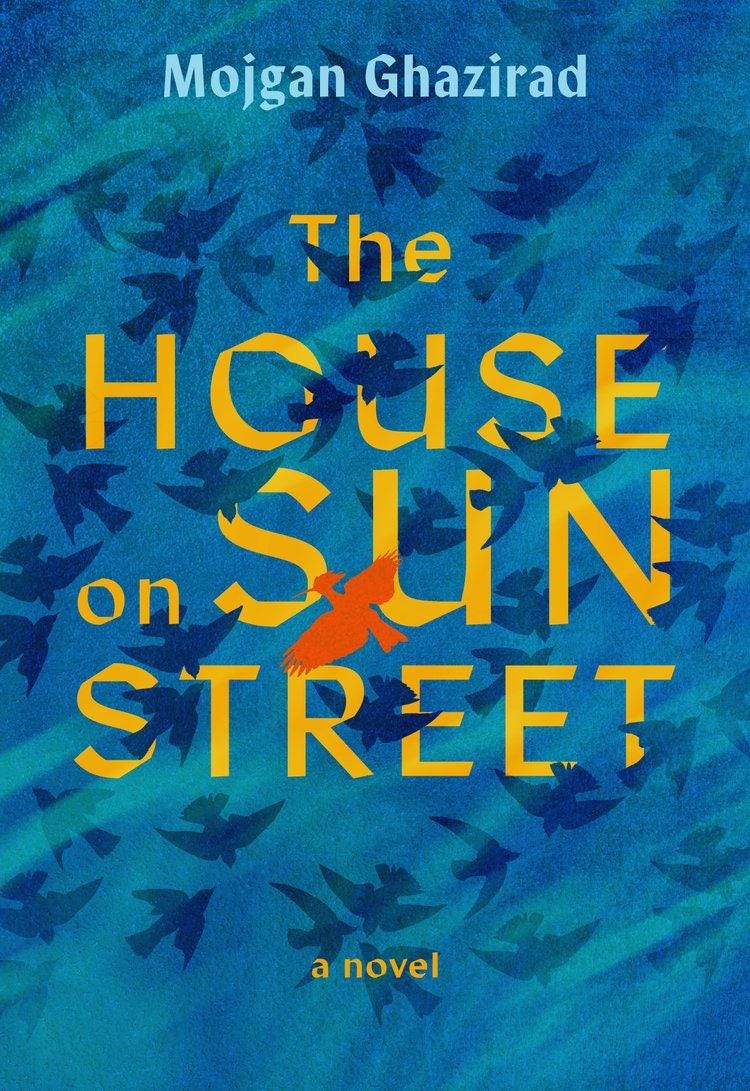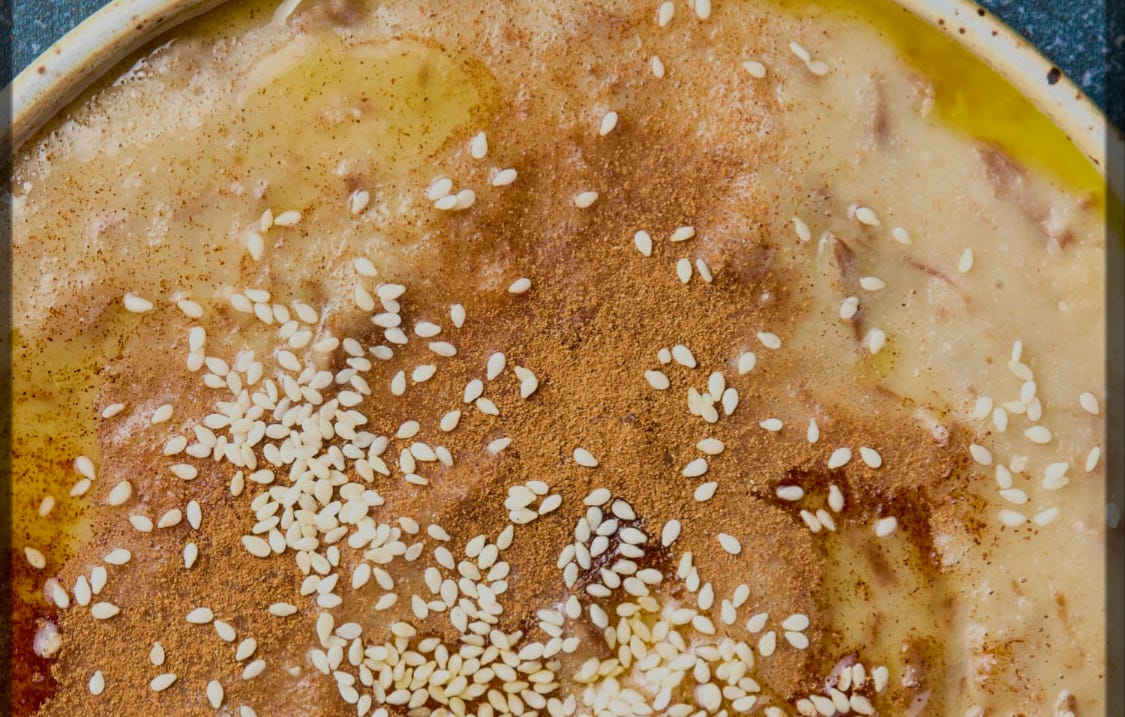For subscribers both free and paid
In the coming months, Poor Man’s Feast will be featuring breakfast conversations with a wide variety of artists, writers, musicians, and thinkers. It will almost always include a recipe.
Each conversation will be released in full for paid subscribers only and live in the archives. Free subscribers will have access to a portion of the conversation, as always. A portion of the proceeds of every breakfast conversation will be donated to a number of organizations dedicated to feeding children at both the macro and micro levels, beginning with Save the Children.
Thank you - Elissa

We live in a world of tumult, of abject chaos — my physicist friends tell me the universe is chaos — which is Greek for the word abyss, or void. This never seems to change, as evidenced by the withering events unfolding in the world around us. In 1979, when I was a sixteen-year-old teenager in Queens, New York listening to the Beatles, and playing softball every day after high school, and my worries were mostly limited to surviving the wrath of a very messy divorce and where I was going to go to college, another country half a world away was devolving into revolution. Everything Iran had been known for — its art and language, its beauty and history, its utterly magnetic poetry — was changing; from where I sat, thousands of miles away, it was like watching a thick scrim be pulled down over a stunning culture that had given so much to the world.
And yet: A light here requires a shadow there, said Mrs. Ramsay in To The Lighthouse. Where there is darkness, there is light. It is this light — this possibility of love, and peace, memory, and beauty — that is foundational in novelist Mojgan Ghazirad’s astonishingly beautiful debut novel, The House on Sun Street, which tells the story of a young girl growing up in Tehran in the days leading up to and during the Islamic Revolution. As the world collapses around her and everything she knows to be safe is turned upside down, young Moji’s education, her family, her gender, and her culture are imperiled.
A native of Iran, Mojgan Ghazirad graduated from Tehran University of Medical Sciences with a medical degree. A neonatalogist, she studied pediatrics at Inova Children’s Hospital and received her neonatal medicine specialty from George Washington University. She currently works as an assistant professor of pediatrics at the George Washington University Hospital and Children’s National Hospital in Washington, DC. Her essays and short stories in English have appeared in Longreads, Michigan Quarterly Review, Idaho Review, New Orleans Review, Nowruz Journal, The Common, Assignment, Best American Travel Writing 2020, etc. Her Persian writings have been published in Zanan, Hengam, Shargh Daily, and Salamat Magazine.
Mojgan has published three collections of short stories in Farsi in Iran and Europe: A Lover in White Jacket in 2012 in Iran, Turquoise Dream in 2014 in Germany, and her last collection In the Solitude of Suitcases in 2016 in the UK. She earned an MFA in creative writing from the Mountainview Low-Residency MFA in January 2018. The House on Sun Street was published in October 2023.
Here are some of Mojgan’s thoughts about breakfast:
EA: Of all meals, breakfast seems to me to be the most personal and ritualistic. What is on your table every morning?
MG: Nowadays, when I come back home from my call in the NICU, my husband and I try our best to have breakfast together. He often comes home earlier than me from his shift in the hospital and prepares the breakfast table that is set near our backyard window. He brews the cardamom tea in our electric samovar, fries a pair of eggs with pul biber spice for the two of us, and serves it with the mint we have grown in our garden and a half circle flat bread we buy from the Middle Eastern market near our home. I love this breakfast ritual since it has become the only time my husband and I have together in our busy life of overnight working physicians.
The sweet porridge was a bond between the family, a kind of sweet amalgam that connected us around the table during the heated political debates of the weekends.
EA: I've found that the children of breakfast people tend to grow up to be breakfast people. Is this true in your case? Did you grow up in a breakfast-loving household? What was your childhood breakfast tradition like?
MG: I remember the days I was a little girl in my grandparent’s garden when I woke up early in the morning on the weekends. We slept on the wooden divans under mosquito canopies during the summertime on the cool terrace. As the chill of the early morning woke me up, I could smell the aroma of my grandmother’s special breakfast for the weekends which was called haleem from her kitchen. She rose before dawn to stir the simmering wheat and mashed lamb in a giant cauldron. It was my favorite dish, a sweet, golden porridge garnished with melted butter, confectioners’ sugar, and cinnamon. We used to have that breakfast after we had folded the mattresses and spread a tablecloth on the divan rug. Haleem was served with sesame Sangak bread that my grandfather had just bought from the neighborhood bakery. The sweet porridge was a bond between the family, a kind of sweet amalgam that connected us around the table during the heated political debates of the weekends.
EA: Is there anything that you long for/have to have/must have/carry with you in the mornings when you aren't home, given your hours in the NICU?
MG: Unfortunately, there are times that I am so busy in the NICU that I cannot make it to the breakfast table. The case is the same for my husband. On those days, I quickly go to the physicians’ lounge and grab a cup of coffee to help me continue working in the NICU until my colleague comes, and I can sign off my responsibilities to her. Those days—while I am exhausted and sleep-deprived—I cherish the value of a peaceful breakfast with my family the most.
I prefer to have breakfast at home, glancing at our back garden and enjoying the taste of a well-brewed black tea even on the days that neither of us is working overnight. The calm that surrounds the table prepares me for a productive writing day or a busy NICU call the following night.
EA: It's a quiet weekend morning; your schedule is open and there's nowhere you have to be. Do you prefer to have breakfast in or out? What would be the ideal scenario for you?
MG: With my busy life as a neologist in America, I hardly find time to cook such an elaborate dish for breakfast, but the delicious haleem remains my favorite morning meal of all time. Still, when I go back to Iran for a visit, I look for haleem on the breakfast menu of restaurants to relive the great memories I had in my grandparents’ garden.
Thank you, Mojgan, for these beautiful words — EA.
Haleem
EA: This recipe comes from recipe developer Hami Sharafi. He writes,
Haleem is a popular dish in Middle Eastern and South Asian cuisine, including countries like Pakistan, India, Bangladesh, and Iran. It typically consists of meat (such as beef, lamb, chicken, or turkey) and grains like wheat or barley. Slow-cooked to a thick, porridge-like consistency, it's enjoyed during Ramadan for its filling nature. Persian Halim is a variation that is popular in Iran. It is made mainly from wheat and meat, cooked until creamy. It's served with toppings like cinnamon, sugar, and fried onions for special occasions. It's also a popular choice for breakfast and has different variations across different cities in Iran. Creating Haleem is a labor of love, requiring patience and dedication. I recommend breaking it down over two days to make the process more manageable. This approach allows you to fully appreciate each step without feeling overwhelmed. While it may take time, the result is undoubtedly worth the effort. I used unpeeled wheat, which made cooking the wheat and extracting the wheat milk more time-consuming. You can speed up the process by using pelted wheat. You can also make extra and freeze it in portion-sized freezer bags. The rich flavors and comforting texture of homemade Haleem are unmatched, making it a culinary journey well worth embarking on.
Mojgan adds: I know it is hard to make :), but it’s worth a try!
Method of preparing Haleem
Cook the wheat
Rinse the wheat that was soaked in water overnight and transfer it to a large pot. Add 3l of water and bring it to a boil. Skim off any foam from the surface. Reduce the heat, close the lid and let it simmer up to for 4 hours until the wheat grains are soft. Stir occasionally.
Add more freshly boiled water, if needed.
Cook the lamb neck
Meanwhile, heat 1 tbsp ghee in a pan and sauté the sliced onion for about 5 minutes.
Add the lamb neck to the pan with the onion, along with the cinnamon stick and bone with marrow if you have one.
Add 500ml freshly boiled water to the pan and salt to taste.
Put on the lid and let the meat cook for 2 to 3 hours. Add more boiled water if needed.
Once the meat is perfectly tender, remove it from the pan and pull it apart with two forks.
For a creamier, stickier result you can also mash the meat to break it down further. Set it aside for later.
Pour the content of the pan through a strainer, catching the cooking liquid. Add the bone marrow to it. Set it aside.
Prepare the wheat mixture
Once the wheat grains are cooked soft, drain them in a colander, catching the cooking water. It will have a thick, starchy consistency now.
Blend the cooked wheat in a food processor, adding some of the cooking water and regular, warm water to achieve an oatmeal-like consistency. If you can’t fit all the wheat in your blender, process it in batches.
Poor the mixture through a strainer, catching the wheat milk in a pot. Stir the mixture in the strainer to extract as much wheat milk as possible.
Transfer the squeezed wheat back to the food processor and blend it with some cooking water and warm water again. Then strain it again and stir the mixture in the strainer to get as much wheat milk out of it as possible. Repeat these steps a third time to get the most out of the wheat.
Discard the remaining wheat bran.
Cooking the Haleem
Bring the thick wheat milk to a boil, then reduce the heat to low and let it simmer for about 2 hours, stirring regularly.
Add 3 tbsp butter, the mashed meat, the cooking liquid of the meat and salt to taste.
Keep stirring until you achieve a thickening to a porridge-like consistency.
Serving
Transfer the Haleem to a serving bowl. Melt the remaining butter and pour it over the Haleem. Garnish with sesame seeds, cinnamon powder, and saffron threads if you like. In Iran, we eat Haleem sweet. You can combine it with a few teaspoons of sugar and enjoy it with Naan Barbari or Sangak or your favorite bread.







This is beautiful - I think I’d like someone else to cook the haleem for me though!
Lovely. Thank you. And it was fun to read about Children's and GWU. I receive cardiac care at GWU and for years worked at Children's National so know the NICU well. I wonder if we crossed paths. I used to walk it with Dr. Cora-Bramble. Found memories.